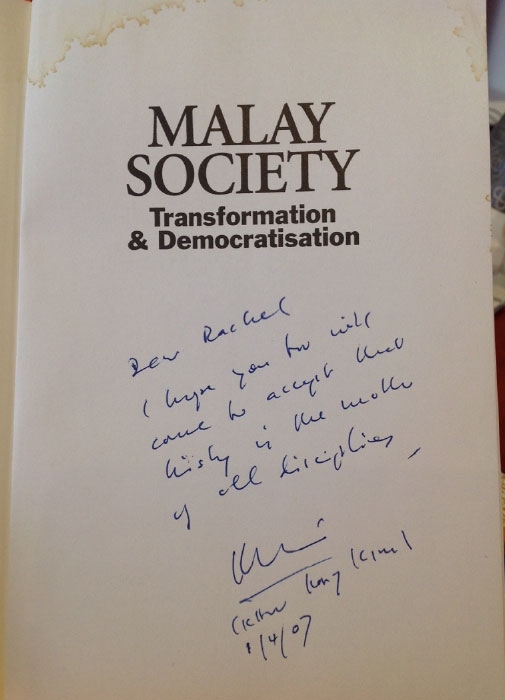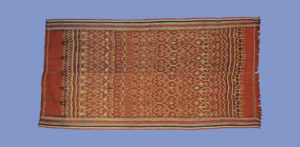By Rachel Leow. First published in The Malaysian Insider, 15 April 2015.
Dear Professor Khoo,
You may not remember me and anyway, if you saw me today you probably wouldn’t recognise me. I was just a young student back then, thrilled to have run into you on a stairwell in Universiti Malaya. I told you I’d been planning to do a PhD in history. You listened indulgently to me stammering away, and at the end of it, gave me a copy of your book, Malay Society.

On the title page, you wrote:
Dear Rachel,
I hope you too will come to accept that history is the mother of all disciplines.
Khoo Kay Kim, 1/4/07
It’s now 2015. I did that PhD, and your book has accompanied me across three continents over the last eight years. I haven’t seen you since, and I’m sure you have long put me out of your mind. But I have continued, from time to time, to be guided by your work and to find insight in it.
Last Sunday, I read news of your testimony at the trial of Mat Sabu (PAS deputy president Mohamad Sabu). And I was filled with a kind of sadness and dread, reminded of how what we know as “history” lives at all times in the shadow of power.
On the question of dinaung v dijajah
You said that to call Malaya a colony is false, because we were “dinaung” and not “dijajah”, and we had nine sovereign monarchies which were never “colonised”. This is an astonishing conclusion. It’s a game of semantics that completely rejects the careful study of systems of imperial and colonial rule which historians do, and which you know so well.
If Malaya wasn’t “colonised”, then neither was India, with all its princely states, or any part of Africa that was governed through local leaders. Brokerage and ruling by proxy are key elements of what we understand as colonial empires.
Direct annexation is expensive: it’s much better to work through pliable local leaders, like chieftains, nawabs, and yes, even sultans.
But how can I presume to teach you what you know so well? Let me quote your own book at you, the one you signed for me:
“…in general, the most sweeping change introduced by the British was the establishment of a more elaborate and highly centralised administrative machinery to replace the indigenous administrative system which was somewhat loosely structured. The British undermined the position of the orang besar, the most powerful group in the indigenous political system… The policy of ruling the Malays through their sultan proved highly successful on the whole.” [ii]
No one is disputing the fact that there are structural differences between a protectorate and colony. But to use those distinctions to claim that the case of Malaya stands entirely outside the set of objects of historical study called “colonial empires” is not only wrong: it is positively perverse.
The day that this becomes canonical in Malaysian history textbooks is the day we should all revoke our professional credentials as historians.
On the question of the police and who they served
You said that the police at Bukit Kepong were not under the colonial government, as Johor and other Malay states were sovereign states. [iii] This, again, rests on the very perverse interpretation of “sovereignty” which I mention above.
In any case, it simply isn’t true even from the point of view of the chain of command. Yes, the early chiefs of police in Johore were Malay. [iv] But its last Malay chief of police was Che Ishmael Bachok in 1912, after which the Johor police was under the command of British men until independence.
During the Bukit Kepong incident, the chiefs of Police in Johor were L.F. Knight, and then P.H.D. Jackson. [v]
The whole peninsula’s police force was amalgamated into the Federation of Malaya Police in 1948, under a British commissioner, H.B. Langworthy, and later Col Nicol Gray, who’d been seconded from the British Palestine police. [vi] It was only on July 24, 1958, long after Bukit Kepong, that this Federation of Malaya Police Force, anointed by the first Yang di-Pertuan Agong of independent Malaya, became, as it is now, diraja – directly royal.
And anyway Bukit Kepong happened during the Emergency, when all civil and military units were placed under the command of British officers and directors of operations. So, to say that the Malay police were “under” the sultans at the time of Bukit Kepong seems an unhelpful misrepresentation of the nature of Emergency governance, as well as of the history of policing in Malaysia. [vii]
On the question of ‘the Malays’
You appear to have said that in “those days” there were two kinds of Malays: “the Malays” from the peninsula, and “other Malaysians”, who were Indonesians.
You also appear to have said that “the Malays” joined Umno and “other Malaysians” joined the left-wing PKMM. Then you said that Mat Indera was an “other Malaysian”, [viii] and because of this was “prone to left-wing movements”. [ix]
I am happy to accept you may have been misquoted by the media here, because this is an unbelievable confusion of falsehoods. You know the literature on Malayness far better than I do.
Using “other” Malays in this context is an awful simplification of a rich and subtle seam of historical work on the origins and evolution of Malayness as identity, census category, civilisational signifier and so on. [x] And invoking this literature to map Malay political loyalties is utterly disingenuous.
It is simply not true that “Malays” were all pro-Umno and “other” left-wing Malays were all from Indonesia and furnished the ranks of the PKMM and the Communist Party (if that is in fact what you said, which I can hardly believe).
Mat Indera himself was born in Batu Pahat, for one thing, and as recent communist memoirs have detailed with great sentiment, there were plenty of young idealistic local Malays serving in the Tenth Regiment army who died for their beliefs – or at least, for each other in the name of those beliefs. [xi]
You have an entire chapter on the Malay left in that book you signed for me, stating that although “it is well known that Indonesian political activists greatly influenced the political thinking of a large section of the Malay population… Still, Malay politics in the peninsula revealed certain characteristics of its own which deserve greater attention.” [xii]
You then proceed, in the fashion of a diligent and careful historian, to examine the differences in Malay political association across different states and groupings. You showed that we can understand the Malay communists as occupying the extreme end of a spectrum of left-wing groups who shared certain aspirations: of egalitarianism and social justice, of anti-British fury and of the unity of the Malays in a newly political age.
If we are to understand Malay political activity in this period, we cannot fail to include in our study the commitment which a significant portion of local left-wing Malays made to communism, and why they chose to do so.
On the question of communism and nationalism
You said that the objective of the communists was a communist world order, and they did not support the establishment of a nation-state. [xiii]
Yet you know very well that this was precisely the period of united front cooperation between communists and other left-wing groups. The ideology of Marxism across the Third World and decolonising states was easily allied with nationalist anti-imperialism.
Marxism lent its language and categories of analysis to Malays, as it did to many other groups, fighting essentially for independence – yes, even irrespective of their commitments to Islam. [xiv]
As you say in your own PhD thesis, “the KMM was the first truly political Malay association in the country committed to the cause of independence. It held comparatively radical views for it was not only anti-British but was critical of the upper strata of Malay society which it described as ‘kaum2 burdjuis-feodalis’.” [xv]
You know that states like Johor, Pahang, Perak and Kelantan all nurtured a long tradition of local Malay rebellion against British rule, from the Naning Wars of the early 19th century up to the To’ Janggut rebellions of the early 20th century, and well into the fractious era of post-war Malay nationalisms.
You were one of the first of our historians to write about two of those rebellions (Kelantan and Terengganu) in your PhD, which I’ve read, and was so inspired by. [xvi] You will also know that Malay communists drew deeply on this tradition, which they referred to as an illustrious history of peasant revolt.
As for Mat Indera? Well, as you know, one of the key skills of a historian is the ability to understand how people in the past thought about what they were doing, on their own terms. And I think it would be hard to deny that Mat Indera’s conception of what he was fighting for was something one might call nationalism.
We do ourselves no favours by failing to acknowledge the complexity of politics in this important period in our nation’s history. Mat Indera was Malay, he was Muslim, he subscribed to communist ideology, he was a willing and formidable member of the Malayan Communist Party, and he also believed absolutely in the need to evict the British from Malaya.
These visions were not incompatible with each other: this was, after all, a time when there were many competing ideas about what the nation would look, none of which had really been fixed yet.
Indeed, as the late Donna Amoroso’s book suggests, even Umno had to learn a new language of nationalism in this post-war period- too: it was not something that had come naturally to them. [xvii]
But again, how can I presume to tell you this? You know it so well, and you say it in your book. Let me quote you again, from your entire chapter on “The Malay Left”:
“While terms such as ‘socialism’, ‘communism’ and ‘democracy’ have long been used in Malaya before independence, it would be unwise to classify Malay political activists (of that time) into clearly-defined ideological categories”. [xviii]
Professor, how do we understand the history of Malaysia, the history of empire, the history of the world in the 20th century, and indeed the subtleties of history as a discipline itself, without acknowledging the conceivable truth of Mat Indera’s nationalism? Is this richness and complexity not the very reason that history is the mother of all disciplines?
On history and morality
Above all, you said that historians are not in the business of making moral judgments. [xix]
But I think that in this court case, you cannot absolve yourself of the responsibility of moral judgment.
Let’s stop to think for a second about what you have been asked to do in this trial. For what charges would Mat Sabu go to jail?
Mat Sabu is said to have made statements to the effect that:
- Mat Indera and the communist forces he led to Bukit Kepong were the true national heroes for fighting the British, rather than the police defending Bukit Kepong, who were lackeys of the British and therefore not national heroes.
- Umno founders were not national heroes because they were lackeys of the British. So in this court case, history is to be rolled out to adjudicate the following claims:
- It is defamatory to suggest that the Alliance leaders who established what we know as independent Malaysia today were not patriots;
- It is defamatory to suggest that the police and those who defended Bukit Kepong were not patriots; and,
- It is defamatory to suggest that communists had patriotic motives.
Stated like this and stripped of emotional baggage, [xx] I hope you can see that this court case boils down to a plea for the historian (you) to adjudicate: who is the nationalist hero? Who is the patriot? Who is the counterrevolutionary and the traitor?
To me, it’s crazy that this claim is being discussed in court, rather than being energetically debated in classrooms. [xxi] But given that it is now a question of legal inquiry, you are in the position of being able to send a man to jail with your testimony.
Whether you acknowledge it or not, it is a matter of moral action now. For in these circumstances, historians act as arbiters of truth and falsehood, and as such, we put the weight of our professional authority in the service of moral or immoral outcomes. [xxii]
So I asked myself: did you give an impartial testimony in the interests of a moral outcome? I think I have shown in this letter that you haven’t, even and especially by the standards of your own past work as a careful, inspirational and professional historian – the one I met on that stairwell in UM so many years ago.
I do believe, as you counselled me then, that history is the mother of all disciplines. And it’s precisely because I believe it that I am so saddened. You know all this history more extensively, more certainly, than I do.
You have spent a lifetime immersed in the study of the past – a privilege that probably few of our fellow Malaysians understand. But it’s those who understand that privilege – I am lucky to count myself among them – who feel the deepest anguish at what I can only call a betrayal of our profession’s value and dignity.
I have not presumed to write such a letter in protest of any of the other numerous perversions of justice in Malaysia. Not Anwar’s insane trial. [xxiii]
Not the insane haemorrhaging of national funds that appears to have occurred in the name of 1MDB. [xxiv] Not the decimation of the Malaysian rainforests in the name of profit. [xxv]
Not the many civilian arrests that have been made under the flimsiest charges of “sedition”. [xxvi]
But I have written this one, because in no other circumstance have I thought my writing would have any meaning to the people who have the power to change the course of those perversions.
In that respect, I am writing to you simply as one historian to another, because you do have that power – to change your own mind and actions. I hope you might reconsider the testimony you gave, which may otherwise condemn an innocent (if impolite) man to jail, and our nation to the grievous abnegation of its truer histories.
As I’m of the opinion that Mat Sabu should apologise (for not being sopan santun in the public sphere, which sets a bad precedent) but should not be jailed. – April 15, 2015.
–
* Rachel Leow is lecturer at the Faculty of History, Cambridge University.
* This is the personal opinion of the writer or publication and does not necessarily represent the views of The Malaysian Insider.
For a book which makes this explicit, Frederick Cooper and Jane Burbank, Empires in World History: Power and the Politics of Difference (Princeton: Princeton University Press, 2012).
[ii] Khoo Kay Kim, Malay Society, p. 128. Italics mine for emphasis.
[iii] “Prof Emeritus Dr Khoo Kay Kim told the Sessions Court here today that police were working for the Malay rulers and not for the British when the communists attacked Bukit Kepong in 1950.”
[iv] Dato’ Banjara Luar (1882-1883), Abdullah bin Tahir (1883-1886), Dato Sri Setia Raja (1887-1903), Abdullah bin Ja’afar (1906-1907).
[v] Federation of Malaya, Federation of Malaya and its Police, 1786-1952 (Kuala Lumpur: Government Printing Office, 1952).
[vi] Leon Comber, Malaya’s Secret Police, 1945-60: The Role of the Special Branch in the Malayan Emergency (Singapore: ISEAS, 2008).
[vii] For a good description of the authoritarian conditions under Emergency rule, see Cheah Boon Kheng, ‘The Communist Insurgency in Malaysia, 1948-90: Contesting the Nation-State and Social Change’, New Zealand Journal of Asian Studies 11(1) (June 2009). Governance during the Malayan Emergency had an unusual unified civil-military command structure: headed by civilians (although military men played key roles in the top posts), with a single Director of Operations who had operational control over all police and army counterinsurgency efforts. And British men held the majority of those top posts until 1956. See R. W. Komer, ‘The Malayan Emergency in Retrospect: Organization of a Successful Counterinsurgency Effort’, Rand Corporation report, February 1972.
[viii] “Other Malaysians” is an anachronistic census category from the 1920s. It did refer to “Malays” who emigrated from other parts of the archipelago, like Banjarese, Sumatrans, Sundanese, Bugis etc.
[ix] ‘Khoo also told the court that in those days, there were two types of Malays – one known as “The Malays”, who were from the peninsular, and the other was called “Other Malaysians”, who were of Indonesian origin. Both sides had different struggles, he said, with “The Malays” joining Umno and the “Other Malaysians” standing with Partai Kebangsaan Melayu Malaya (PKMM), a leftist organisation…. Asked if he knew who Mat Indera was, Khoo said he was an “Other Malaysian” linked to PKMM, so it was not surprising that the man was prone to leftist movements.’
[x] In case you have forgotten, Anthony Milner, The Malays; Leonard Andaya, Leaves of the Same Tree; Joel Kahn Other Malays; Tim Barnard et al., Contesting Malayness; Henk Maier We Have been Playing Relatives etc.
[xi] See Abdullah CD’s Memoir Abdullah C. D. Bahagian Kedua: Penaja dan Pemimpin Rejimen Ke-10. Of course these sorts of memoirs have their own axes to grind too, though they’re also incredible resources for a fascinating period in Malaysian history. Which is why we need historians to give the reasoned, balanced assessment in the service of a useful public debate.
[xii] Khoo, Malay Society, p. 194
[xiii] “On whether the attackers were heroes fighting for independence, he said the objective of communists was a communist world order, which had no boundaries. To communists, Communist International (Comintern) was the most important. ‘They did not support the setting up of a nation state,’ he said.”
[xiv] The debates on the compatibility between Islam and communism are fascinating and important; see eg. Tan Malaka on Communism and pan-Islamism
(1922) , and other debates among Indonesian radicals like Haji Misbach and Datuk Batuah, featured in Ruth McVey, The Rise of Indonesian Communism (Cornell: SEAP Press, 1965), esp. ch. 5. I am not making a statement that they are compatible; I just want to show that in the context of early to mid-20th century Malaya there were precedents for, and good reasons why, some Malays might have understood them to be compatible.
[xv] Khoo Kay Kim, ‘The Beginnings of Political Extremism in Malaya, 1915-1935’, Ph. D. thesis, University of Malaya (1979), p.125.
[xvi] Khoo, ‘The Beginnings of Political Extremism in Malaya’.
[xvii] Donna Amoroso, Traditionalism and the Ascendency of the Malay Ruling Class in Colonial Malaya (Singapore: NUS Press, 2014). (https://plus.google.com/116149365819672226451)
[xviii] Khoo, Malay Society, p. 128. Italics mine for emphasis.
[xix] “History is something that can be tested and inferences drawn from it must be precise. Historians are not allowed to make moral judgements.”
[xx] Let me say here that I believe the reaction of the Bukit Kepong survivors and their families to Mat Sabu’s statements to be entirely understandable. What the guerrillas did at Bukit Kepong was atrocious, horrific. The violence of it is matched only by the likes of, say, what the British did at Batang Kali, and all the other “terrorist elimination” operations they carried out. For this was war, although the British did not wish to call it that. In conditions of war, all sides commit unspeakable atrocities. On how the British did not like to call this a civil war, see Philip Deery, ‘The Terminology of Terrorism: Malaya, 1948-52’, Journal of Southeast Asian Studies, Vol. 34, No. 2 (2003).
[xxi] I also do not think that history should be so baldly in the business of extracting “heroes” or “non-heroes” from the past. History is for deeply understanding the present, or for learning sympathy for an unthinkably distant past. I don’t think it’s for finding action figures and pahlawan to put on our national shelves – do you?
[xxii] As an example, the trial in 2000 featuring Deborah Lipstadt vs. Holocaust denier David Irving, with historian Richard Evans as arbiter of the historical evidence. See
[xxiii] ‘Court upholds five-year jail term for Malaysia’s Anwar’
[xxiv] ‘Jho Low to feature in New York Times real estate expose’
[xxv] ‘Illegal Logging and Related Trade: The Response in Malaysia’
[xxvi] ‘Zulkiflee Anwar Alhaque charged after critical tweets’
Download the PDF for this article here – Open letter to Khoo Kay Kim by Rachel Leow – The Malaysian Insider




